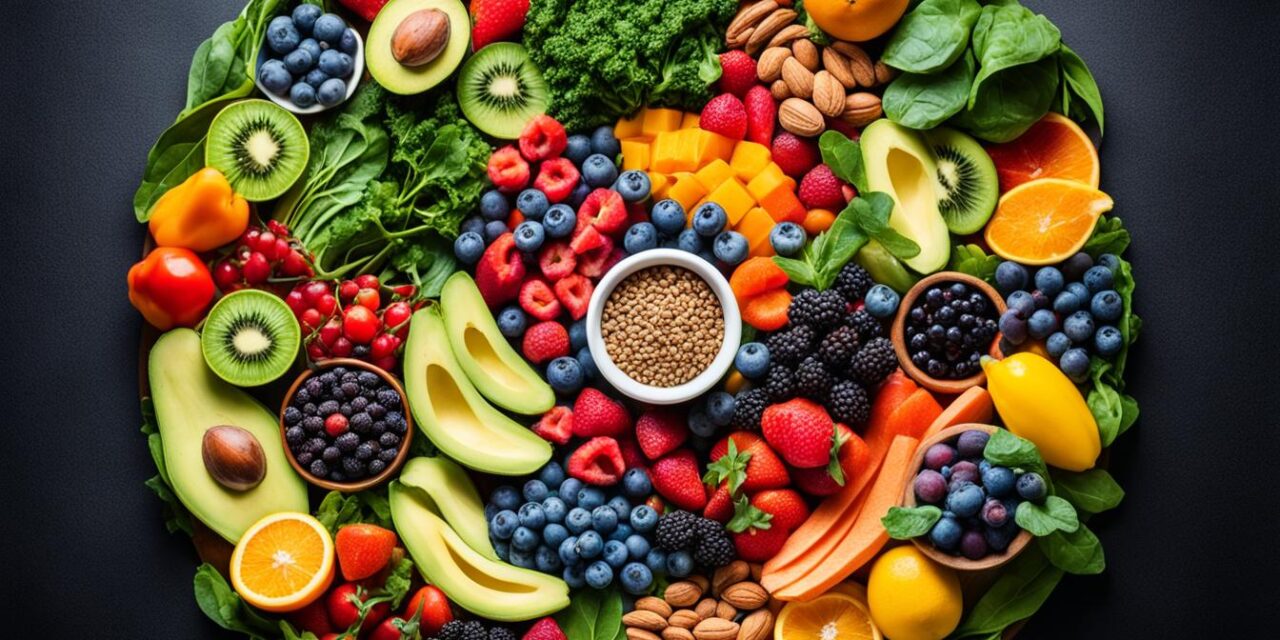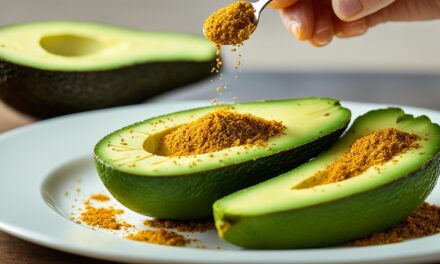Did you know that chronic stress affects more than 40% of adults in the United States?
Stress has become an endemic problem in our fast-paced modern lives, taking a toll on both our physical and emotional well-being. Thankfully, there are natural ways to combat stress and promote a sense of calm. One powerful approach is through nutrition. By incorporating stress-relieving superfoods into your diet, you can eat your way to a more relaxed and balanced life.
Key Takeaways:
- Incorporating stress-relieving superfoods into your diet can help you manage and reduce stress levels.
- There are 42 superfoods for stress relief that offer unique benefits for promoting calmness.
- By focusing on a stress-reducing diet, you can support your overall health and well-being.
- Stress relief through nutrition is a natural and effective way to combat chronic stress and promote a sense of calm.
- Remember to prioritize self-care and implement stress management techniques to complement a balanced diet.
Matcha Powder: A Stress-Relieving Powerhouse
When it comes to finding natural ways to relieve stress, look no further than matcha powder. This vibrant green tea powder is not only delicious but also packed with stress-relieving benefits. One of the key components that make matcha so powerful is its high content of L-theanine, an amino acid known for its ability to promote relaxation and reduce anxiety.
Studies have shown that L-theanine has a direct impact on the brain, increasing alpha wave activity, which is associated with a state of calm and alertness. This makes matcha an ideal choice for those looking to find a moment of tranquility in their busy lives.
But what sets matcha apart from other green teas? Well, matcha is made from whole tea leaves that are carefully ground into a fine powder. This means that when you drink matcha, you are consuming the entire leaf and all of its stress-relieving compounds.
One study even found that participants who consumed matcha powder in cookies experienced reduced activity of the stress marker salivary alpha-amylase. So not only can you enjoy a calming cup of matcha tea, but you can also incorporate it into your favorite baked goods for a stress-relieving treat!
Matcha Powder in Cookies Recipe
If you’re ready to give matcha powder a try in a delicious and stress-relieving way, here’s a simple recipe for matcha cookies:
- Ingredients:
- 1 cup all-purpose flour
- 1/2 cup unsalted butter, softened
- 1/2 cup granulated sugar
- 1 tablespoon matcha powder
- 1/4 teaspoon salt
- Instructions:
- Preheat your oven to 350°F (175°C). Line a baking sheet with parchment paper.
- In a mixing bowl, cream together the softened butter and granulated sugar until light and fluffy.
- In a separate bowl, whisk together the all-purpose flour, matcha powder, and salt.
- Add the dry ingredients to the butter and sugar mixture and mix until combined.
- Shape the dough into small balls and place them on the prepared baking sheet.
- Bake for 12-15 minutes, or until the edges of the cookies are lightly golden.
- Allow the cookies to cool on a wire rack before enjoying.
So go ahead, whip up a batch of these stress-relieving matcha cookies and indulge in a moment of calm. Your taste buds and your wellbeing will thank you!
| Benefits of Matcha Powder: | Recipe |
|---|---|
|
|
Swiss Chard: Packed with Stress-Fighting Nutrients
Swiss chard, with its vibrant colors and robust flavor, is not only a delicious addition to your meals but also a powerful stress-fighting food. This leafy green vegetable is packed with essential nutrients, including a high amount of magnesium. Magnesium plays a crucial role in your body’s stress response, making Swiss chard a valuable asset in combating anxiety, panic attacks, and chronic stress.
Low levels of magnesium have been associated with increased anxiety and a higher risk of panic attacks. The demands of a hectic lifestyle and chronic stress can deplete your body’s magnesium stores, further exacerbating these symptoms. By incorporating Swiss chard into your diet, you can replenish and maintain optimal magnesium levels, helping to alleviate stress and promote a sense of calm.
The Magnesium-Mood Connection
Magnesium is an essential mineral that acts as a natural relaxant, promoting relaxation and reducing stress levels. It helps regulate the production of stress hormones, such as cortisol, in the body. By modulating cortisol levels, magnesium can help prevent the harmful effects of chronic stress, including inflammation, digestive disturbances, and sleep problems.
Moreover, magnesium plays a crucial role in supporting neurotransmitter function in the brain, particularly those involved in mood regulation, such as serotonin. Adequate magnesium levels are essential for the synthesis and release of serotonin, a neurotransmitter often referred to as the “feel-good hormone.” Low serotonin levels have been linked to depression and anxiety disorders, further emphasizing the importance of maintaining optimal magnesium levels for mental well-being.
To fully enjoy the stress-relieving benefits of Swiss chard, try incorporating it into your meals in various ways. You can sauté it with garlic and olive oil, add it to soups or stews, or even use it as a bed for grilled lean meats or fish. The versatility of Swiss chard allows you to get creative in the kitchen while reaping the nutritional rewards.
Don’t just take our word for it—here’s what renowned nutritionist Dr. Jane Williams has to say about Swiss chard:
“Swiss chard is a powerhouse of stress-fighting nutrients, particularly magnesium. Adding this leafy green vegetable to your diet can provide valuable support for your body’s stress response and help promote a sense of calm. Plus, its vibrant colors and delicious taste make it a welcome addition to any meal.”
| Nutrient | Magnesium Content (per 100g) |
|---|---|
| Magnesium | 150mg |
As the table above demonstrates, Swiss chard is an excellent source of magnesium, providing approximately 150mg per 100g serving. By including Swiss chard in your diet, you can take a proactive step towards managing stress and supporting your overall well-being.
So why not treat yourself to a delicious Swiss chard salad tonight? Your body and mind will thank you for it!
Sweet Potatoes: Lowering Cortisol Levels
When it comes to combating chronic stress, sweet potatoes are the secret weapon you need in your arsenal. These nutrient-rich carbs can work wonders in lowering levels of the stress hormone cortisol, helping you maintain a sense of calm and balance.
Cortisol dysfunction caused by chronic stress can wreak havoc on your body, leading to inflammation and other adverse effects. By incorporating sweet potatoes into your diet, you provide your body with the necessary nutrients to regulate cortisol levels and combat these harmful effects.
Research has shown that participants who follow a diet rich in whole, nutrient-dense carbohydrates experience significantly lower levels of salivary cortisol compared to those who consume a diet high in refined carbs. By choosing sweet potatoes as your go-to carb source, you’re not only satisfying your cravings but also giving your body the tools it needs to fight off the negative impacts of stress.
To fully understand the power of sweet potatoes in managing cortisol levels, let’s take a closer look at the nutrients they contain:
- Vitamin C: Sweet potatoes are packed with vitamin C, a potent antioxidant that helps combat the free radicals triggered by stress and inflammation.
- Potassium: Potassium plays a crucial role in maintaining a healthy balance of fluids in your body, helping to regulate blood pressure and prevent the negative effects of chronic stress.
- Complex Carbohydrates: The complex carbohydrates found in sweet potatoes provide a steady release of energy, preventing blood sugar spikes and crashes that can worsen stress and anxiety.
- Fiber: High in fiber, sweet potatoes promote a healthy digestive system, supporting your gut health and overall well-being.
With their delicious taste and numerous health benefits, sweet potatoes are a stress-relieving superhero you won’t want to overlook. Incorporate them into your meals as a side dish, mash them, roast them, or even use them as a base for nourishing bowls and salads. The possibilities are endless!
So the next time you find yourself overwhelmed by the pressures of everyday life, remember that a simple and delicious sweet potato could be just what you need to calm your cortisol levels and promote a sense of well-being.
Conclusion
Incorporating stress-relieving superfoods into your diet can work wonders for managing stress and improving your overall health. From matcha powder to sweet potatoes, these nutrient-rich foods offer unique benefits in promoting stress relief. But remember, stress management goes beyond just nutrition. It’s crucial to prioritize self-care and implement various stress management techniques alongside a balanced diet to support your overall well-being.
Stress relief begins with what you put on your plate. By incorporating foods like matcha powder, Swiss chard, and sweet potatoes into your daily diet, you provide your body with the necessary nutrients to combat stress and anxiety. These superfoods are rich in antioxidants, vitamins, and minerals that play a vital role in maintaining a healthy stress response.
However, don’t forget that stress management is a holistic approach. Alongside a nutritious diet, make time for activities that bring you joy and relaxation. Engage in regular exercise, practice mindfulness or meditation, and ensure you get enough sleep. By focusing on both your physical and mental well-being, you can effectively manage stress and achieve optimal overall health.
FAQ
What are superfoods for stress relief?
How can eating superfoods help with stress relief?
What are some examples of stress-relieving superfoods?
How does matcha powder help with stress relief?
What role does Swiss chard play in stress relief?
How do sweet potatoes help lower cortisol levels?
Can incorporating stress-relieving superfoods into my diet improve my overall health?
MORE SOURCES TO READ:
- https://www.healthline.com/nutrition/stress-relieving-foods
- https://www.health.com/foods-to-reduce-stress-8419516
- https://www.everand.com/book/693609754/Confidence
![]()














Recent Comments